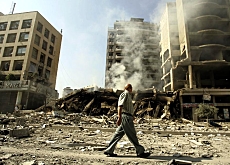
Swiss intellectuals launch peace initiative

Swiss film-makers at the Locarno International Film Festival have called for an immediate ceasefire to end the violence in the Middle East.
The head of the Swiss-run International Committee of the Red Cross (ICRC), Jakob Kellenberger, meanwhile, travelled to Beirut on Monday for talks with the Lebanese government about the humanitarian situation and ongoing relief operations.
Over 100 personalities from the Swiss film world have joined forces at the 59th Locarno International Film Festival to protest against the situation in the Middle East. They also levelled heavy criticism against Israel.
In their public appeal, the Swiss film-makers demanded an “end to all violence” and affirmed their solidarity for their Palestinian and Lebanese colleagues. They accused Israel of being a “criminal state”.
“As Swiss film-makers, artists, intellectuals and citizens, we refuse to remain silent witnesses to this blind strategy of destruction,” they declared in a written statement.
ICRC
In Beirut, the ICRC president met Lebanese President Emile Lahoud, Prime Minister Fouad Siniora, and president of the Lebanese parliament Nabih Berr to discuss ways of providing assistance and protection for those most affected by the armed conflict.
In a statement issued following their talks, the Lebanese president underlined his wish to see the ICRC involved as a neutral intermediary in the liberation of Lebanese detainees held in Israel as part of an exchange of prisoners.
Against the backdrop of ongoing fighting in Lebanon, the organisation of relief operations remains extremely problematic.
A ship loaded with Red Cross supplies travelling from Cyprus arrived in Sidon on Monday, after it had been rerouted from Tyre because of the fighting, the ICRC reported.
Hazardous
Humanitarian groups say military action is hampering efforts to help many of the hundreds of thousands who have fled the conflict.
The problem is particularly acute in southern Lebanon, where people are thought to be cut off by Israeli-Hezbollah fighting.
Relief supplies have moved into Lebanon very slowly since Beirut’s main access road to the north was severely damaged by Israeli warplanes on Friday.
The Geneva-based ICRC, which has convoys trying to deliver aid around Beirut, and to Tyre, Marjayoun, Jezzine and other communities in the south, said bombed out roads bogged down a convoy near the southern border.
“We had planned to reach some villages in the south of Lebanon, but due to the level of hostilities, it’s impossible for us to proceed,” Annick Bouvier, ICRC spokeswoman told Associated Press news agency on Monday.
“We are very concerned because the civilian population in the isolated villages is in need of assistance.”
Urgent needs
People in southern Lebanon’s rural communities have been unable to leave their homes to reach the fruit and vegetables grown on the agricultural land surrounding their villages, she explained. Fuel is also in limited supply to keep water pumps going.
The ICRC has increased its Lebanon appeal tenfold to SFr100 million ($81 million) to provide assistance to civilians. It now has 59 expatriate staff working there, making it the second-largest ICRC operation in the world after Sudan.
Last weekend the Swiss Humanitarian Aid Unit (SHA) provided assistance to 400 families situated in the Chouf mountains, southeast of Beirut.
SHA plans to extend its support to other regions via its collaboration with local organisations.
“We hope to deliver material to existing camps in the south and in the north of the country,” explained Daniel Beyeler, head of the SHA team in Beirut.
swissinfo with agencies
Israel launched its attack against Hezbollah after the Islamic militia kidnapped two of its soldiers.
The Lebanese authorities say that 925 people have been killed, one third of them aged under 13. Another 75 are missing, presumed dead.
During the same period, 90 Israelis, most of them soldiers, have been killed, with 48 dying in Hezbollah rocket attacks.
Diplomats are meanwhile battling to find a workable truce amid the violence. Talks are being held at the United Nations on possible changes to a draft resolution aimed at ending the fighting between Israel and Hezbollah.

In compliance with the JTI standards
More: SWI swissinfo.ch certified by the Journalism Trust Initiative




























You can find an overview of ongoing debates with our journalists here . Please join us!
If you want to start a conversation about a topic raised in this article or want to report factual errors, email us at english@swissinfo.ch.